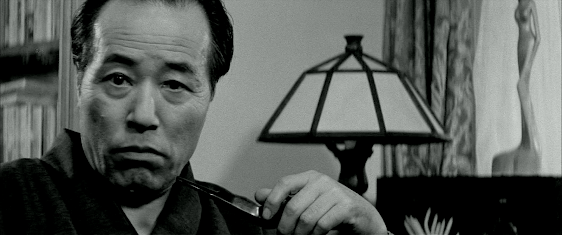Obscure Japanese Film #116
 |
| Tomomi Sato |
 |
| Eitaro Ozawa |
Yoko (Tomomi Sato) is a young woman living in Hokkaido who wants to be a writer. She persuades her husband to take her to Tokyo in order to visit Inamura (Eitaro Ozawa), an older writer she admires whom she hopes may help her find a publisher for her debut novel. Inamura is uncertain of her talent and non-committal, but makes a vague promise to read it properly when he has time. When pressed, he passes it on to a publisher friend, Isshiki (future director Juzo Itami), who happens to be present, and Yoko reluctantly returns to Hokkaido to await a response. However, within a couple of days she has left her husband and come to Tokyo permanently to pursue her literary ambitions.
Yoko begins an affair with Isshiki, who arranges the publication of her novel. She then begins a second affair with Yamaji (Toshiyuki Hosokawa), the young artist who designs the cover for her book. Meanwhile, she is pursued by Akimoto (Hosei Komatsu), a cousin from Hokkaido with whom she has also had an affair. After Inamura’s wife (Yatsuko Tan’ami) dies suddenly, she begins a May-December romance with him and moves in with his family, much to the consternation of his daughter (Emi Shindo) and the maid (Kotoe Hatsui), although his son (Sho Miyashita) welcomes her, thinking it will relieve his father’s loneliness. However, Inamura gradually begins to suspect that Yoko is continuing to see other men behind his back, while she finds his possessiveness suffocating…
Although distributed by Shochiku, this is (like the previously reviewed Wedding Day) an independent production by Kindai Eiga Kyokai, the company formed by director Kozaburo Yoshimura, screenwriter Kaneto Shindo and actor Taiji Tonoyama in 1950. Shindo’s screenplay is based on a series of stories written by Shusei Tokuda (1872-1943) about his relationship with the much younger writer Junko Yamada (1901-61), and it’s clear that Tokuda and Junko are the basis for the characters of Inamura and Yoko. In the film, the flighty and sometimes childish Yoko seems a highly unlikely writer, but it may be that her portrayal is close to the reality of Junko Yamada. According to Japanese Wikipedia, although she published more than 10 books and dozens of essays in magazines and newspapers, she was never taken seriously because of how she had been portrayed in Tokuda’s stories, and is remembered mainly as the subject of scandal rather than for her literary work. (Of course, it could be the case that this lack of attention from the critics was unfair).
I was not entirely convinced by the casting of Tomomi Sato, who had previously played the stewardess in Goke, Body Snatcher from Hell (1968), surely one of the worst films I’ve ever seen. Her performance here is by no means terrible, but it lacks the subtlety and depth that Ayako Wakao might have brought to it. Sato had actually studied with the Haiyuza theatre company, which may have had something to do with her casting as the cast also includes two founding members of Haiyuza, Chieko Higashiyama and, in a rare leading role, Eitaro Ozawa. As a man old enough to know better but unable to control himself once his long-dormant passion has been revived, Ozawa is excellent.
The music by Sei Ikeno flits back and forth between irritatingly repetitive bossa nova lounge muzak and some more effective brooding strings for the darker moments. The cinematography by Masamichi Sato, on the other hand, is consistently effective throughout and makes you glad that the film was not shot in colour. Sweet Secret was the penultimate film of Kozaburo Yoshimura, who lived until the year 2000, but whose ill health made working difficult for him in his later years. It’s clear that in this case he was working on a smaller budget than he had enjoyed in the past, and there’s also a sense that he was struggling to keep up with the times and attempting to make something more akin to a Yasuzo Masumura film (I suspect that Yoshimura might have preferred to make this a period drama and the idea of updating the story from the 1920s to contemporary Japan was likely a condition imposed by Shochiku, although it may have been Shindo's idea as he had previously adapted another Shusei Tokuda story as Stolen Pleasure for Daiei and given it a modern setting). In any case, it’s a decent effort of some interest, although not among the director’s strongest pictures. Perhaps the most intriguing aspect of the film is its ambiguity – it could equally be interpreted as the story of a young woman who uses men to attain her ambitions or as being about men exploiting a young woman’s ambitions in order to gain sexual favours.
The film appears to have been shot in 1968, but not released until 1971.
Bonus trivia: The work of author Shusei Tokuda was adapted for the screen on a number of occasions, beginning in the 1920s with a few silent films now lost, followed by Kaneto Shindo’s Epitome (1953), Mikio Naruse’s Untamed (1957) and Yasuzo Masumura’s Stolen Pleasure (1962). Tokuda’s novel Rough Living (the basis for Untamed) exists in English translation.





No comments:
Post a Comment